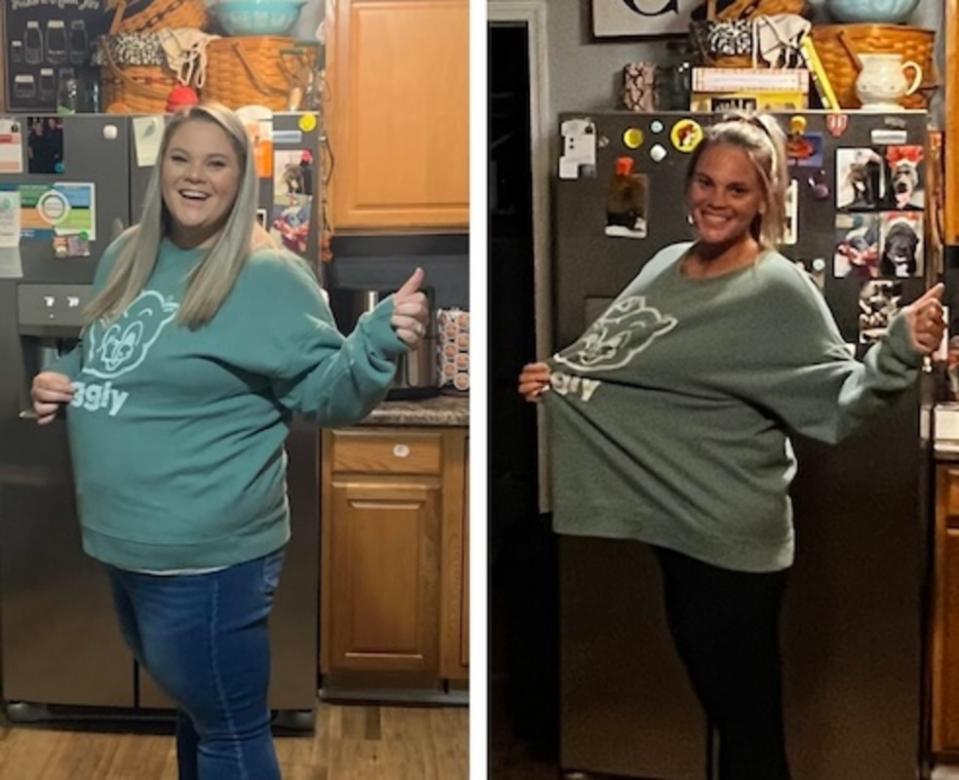These Ozempic Before and After Photos Give a Real-Life Glimpse of What Life is Like on Weight Loss Medication

Alexis Clingenpeel before and after taking weight loss medications.
From the Oscars stage to an hour-long Oprah special, Ozempic and other weight loss medications have entered the public lexicon and risen in popularity.
First things first: Ozempic is not technically approved for weight loss, and it's primary use is for blood control among patients with type 2 diabetes. However, weight loss is a much-talked-about side effect. Another drug, Wegovy, contains the same active ingredient (semaglutide), is made by the same company (Novo Nordisk) and is approved for weight loss. To qualify for the drug, patients must be obese or overweight with a specific underlying condition like high blood pressure.
Eli Lilly also makes two drugs known for helping people lose weight. Mounjaro (for patients with type 2 diabetes) and Zepbound (for overweight and obese people with specific conditions) use the active ingredient Tirzepatide but act similarly to Ozempic and Wegovy.
These drugs have been hailed as game-changers in efforts to curb public health and obesity, which more than 41% of adults in the U.S. were living with from 2017 to March 2020, according to CDC data.
However, these weight loss medications aren't without controversy. Side effects range from non-life-threatening GI discomfort to more serious issues like kidney failure, and shortages have made accessing these medications challenging for those who really need them. Still, for five real women we spoke with, the medications were a transformative tool after long journeys with their weight and other issues. Below, they share their before and after pictures and the stories behind them.
Related: Thinking About Trying a Weight Loss Program? Here's How to Figure Out Which One Is Right for You
Before and After Pictures on Weight Loss Medications
"It...never crosses my mind to eat between meals."

Gray Beard began taking Wegovy in February 2023 to lose weight. She had high blood pressure and slightly elevated A1C levels. She's since lost 40 pounds and credits the changes Wegovy made in her appetite as the catalyst.
"The biggest change I have noticed is in my appetite," says Beard, now a Ro Body Program patient and ambassador. "I used to feel hungry all the time and never felt fully satisfied after I ate. Now, I know that when I am full, I should stop eating. It also never crosses my mind to eat between meals. My tastes have changed, as well. I don’t crave the bad stuff anymore, including alcohol."
However, diet hasn't been Beard's only lifestyle tweak since starting Wegovy. "I never felt that I wasn’t getting enough physical activity," Beard says. "I enjoyed working out and still do. Since starting Wegovy, I have tried to focus more on weight training and less on cardio because aside from losing weight, being on the medicine has also decreased my muscle mass."
Research published in Obesity 2023 indicated that physical activity could help curb the loss of muscle mass, which is crucial for daily functioning, observed in patients taking anti-obesity medications.
"Two Different Worlds"

Emily Clasen was diagnosed with type 2 diabetes in 2016. "I had a lot of denial in being diagnosed with it and a lot of shame," Clasen says. "The doctor that diagnosed me tossed me a blood glucose reader and said, 'Good luck, I’ll see you in a few years for when you need insulin.'"
The advice she did get only exacerbated the blame game, shame and confusion."I’ve been told that if I lose weight, I won't be a diabetic anymore," Clasen says. "I’ve also been told, 'Once a diabetic, always a diabetic.'"
Clasen says she reached her heaviest weight of 352.8 pounds in March of 2021. That summer, she began taking Ozempic and has since switched to Mounjaro for insurance reasons. She has lost 168 pounds and 47.28% of her body weight. Her BMI has gone from 52.1 to 27.2. Importantly, the medications have helped her get her A1C levels within a healthy range and keep them there. Her quality of life has also improved.
"I used to live with constant hip and left knee pain," Clasen says. "At the time, being in my late 20s, I felt as if I should have been aging into my 50s to 60s. That is now completely gone. My PCOS symptoms have gotten a lot better, too. My cycle is more on track. My adult acne has gone down, and my excess facial hair is subsiding. It's incredible."
However, one of the most significant changes Clasen has noticed is how she's treated. "There are two different worlds we live in: A small body and a big body," Clasen says. If you, too, have lost weight and are now in a smaller body, you know exactly what I mean.
If you don't know, allow Clasen to explain."I used to walk into a store and only be greeted—if greeted at all—by the older associates and always women," Clasen says. "When I walk into a store now, I will get greeted, and a casual conversation will start with men and women associates. People want to talk to you while waiting to check out at the grocery store or pumping gas. When you live in a bigger body, some people feel almost invisible. It can be a very lonely feeling when standing in a room full of people."
"I...started to feel like myself again."

Janelle McCormack began taking a semaglutide days before Thanksgiving of 2021, but the results weren't immediate. "It was at least two months on the medication before I started to see weight loss results, but after only a couple of weeks, I started to feel better," McCormack says.
McCormack says it took her 10 months to lose the full 60 pounds recommended by her care team. Her blood sugar levels are also within normal range now. While the physical benefits are significant, she's happiest—literally—with another transformation.
"The biggest change I noticed with semaglutide was actually with my mental and emotional health," McCormack says. "In the past, I had tried to lose weight through willpower alone, and it wasn’t working. I felt unhappy and like I had lost who I was. When I started losing weight, I also started to feel like myself again, which was very motivating to continue losing weight. I was feeling more energetic. I was more mentally present and no longer needed to nap every day at lunch."
"I wish insurance made it easier for more people to get on these medications."

Alexis Clingenpeel was over 200 pounds by her 12th birthday. Flash forward more than a decade, and she describes having type 2 diabetes at 24 as "humiliating."
"I knew I needed to do something soon to change my life," says Clingenpeel, a brand ambassador for Biocare.
That change began on Feb. 8, 2023, when Clingenpeel began taking tirzepatide. She has used Mounjaro and a compounded version. Though she did experience some GI discomfort, Clingenpeel says protein shakes have helped. She lost 122 pounds in 50 weeks and now takes 12.5 mg weekly for maintenance.
A 52-week trial published in JAMA found that people who stopped tirzepatide were more likely to regain lost weight, which is why Clingenpeel has stayed on it. Beyond weight loss, Clingenpeel says her A1C went from 7.1 to 4.9, and her liver enzymes decreased. The key? Clingenpeel says tirzepatide has silenced food noise, making listening to her body's cues easier.
Yet, she says tracking down the medications can be a journey—and one she wants to see become less complicated. Her insurance does cover the medication, so she considers herself one of the "lucky ones."
"I...wish insurance made it easier for more people to get on these medications," Clingenpeel says. "The average person cannot afford $1,200 or $550 with the coupon."
And even if they can, Clingenpeel says finding the drug can be a challenge."Eli Lilly cannot keep up with demand," says Clingenpeel. "There have been massive shortages during my entire journey." Clingenpeel signed up for the telehealth company Join Amble to help her access the medications she needs, which has been helpful.
"You need to utilize all the tools available to you in order to reach your goals."

MM underwent an endoscopic procedure to reduce her stomach size by 80% and wasn't planning to take anti-obesity medications. However, she and her doctor, Dr. Steven Batash, MD, a board-certified gastroenterologist at Batash Endoscopic Weight Loss Center, changed course.
"After my endoscopic procedure, my brain had a hard time getting signals from my stomach," MM says. "I felt physical restriction and even pain from overeating, but food noise still occupied my brain...I wanted to do everything I could to achieve my weight loss goals, and I decided to try medication."
To help her lose weight and adapt to a new lifestyle, MM began taking a semaglutide. It worked. "I mostly walk and do Pilates," MM says. "I am planning on doing more weight training soon, but for now, I try to get my steps in. I try to walk every day, no matter how I feel. At times, I don’t want to move, but once I start, I feel great."
Eating also feels great—better than before she took charge of her weight loss. "When I was heavier, I stressed about everything I ate and often wouldn’t touch foods that I loved," MM says. "I was always afraid that once I started eating the foods I love, I wouldn’t be able to stop. I just avoided certain foods, but it made me want them even more. It was like a vicious cycle. Now I eat three, sometimes four times a day."
Despite the controversy around Ozempic and other anti-obesity medications—and even surgery—MM doesn't regret her decision for a second."I think that you need to utilize all the tools available to you in order to reach your goals," MM says. "Ultimately, you want to be healthy and feel confident in your body. There is no shame in getting help. There is no point in trying to do things that failed you in the past over and over and over."
Related: The Unexpected Health Benefit of Weight Loss Drugs Like Ozempic That No One's Talking About
Anti-Obesity Medication FAQ
How much weight can you lose on drugs like Ozempic in a month?
That answer will vary. "Weight loss is individual, and it also depends on your starting weight," Dr. Batash says. "A larger person can lose 20 pounds by pairing drugs like Ozempic/Wegovy and an endoscopic procedure, but someone who starts at a lower weight might lose only 10 pounds." A 2022-published trial found that people who took semaglutide injections once weekly for six months lost 27 pounds. Another one from the same year on tirzepatide indicated people lost an average of 15% of their body weight in 72 weeks.
What foods should you avoid while taking Ozempic?
There's no such thing as an Ozempic diet.
"You can eat everything," Dr. Batash says. "Portion control is the king when it comes to weight loss. If you do notice that some foods make you feel bad, stop eating them."
Food affects everyone differently. However, anecdotally, high-fat and greasy foods may exacerbate the GI side effects as they sit in the stomach longer.
How do drugs like Ozempic/Wegovy work to help with weight loss?
Semaglutide mimics GLP-1, a hormone released into the small intestine as someone eats to send the brain a memo that they're consuming food. It also helps to slow digestion, helping a person feel satisfied for longer. In short, Dr. Batash says semaglutide helps the body and brain work together to quiet food noise and receive fullness cues.
Next up: This Eating Habit Is One of the Earlier Signs of Alzheimer's, According to a Neurologist
Sources
Medications Containing Semaglutide Marketed for Type 2 Diabetes or Weight Loss. FDA.
Adult Obesity Facts. CDC.
Physical activity in the new era of antiobesity medications. Obesity.
Gray Beard, a Ro Body Program patient and ambassador.
Emily Clasen, who takes Mounjaro
Janelle McCormack, a patient at Resurge Clinic who takes anti-obesity medication
Continued Treatment With Tirzepatide for Maintenance of Weight Reduction in Adults With Obesity. JAMA.
Alexis Clingenpeel, a brand ambassador for Biocare.
MM, who has taken anti-obesity medications
Dr. Steven Batash, MD, a board-certified gastroenterologist at Batash Endoscopic Weight Loss Center
Weight Loss Outcomes Associated With Semaglutide Treatment for Patients With Overweight or Obesity. JAMA.
Tirzepatide Once Weekly for the Treatment of Obesity. NEJM.
